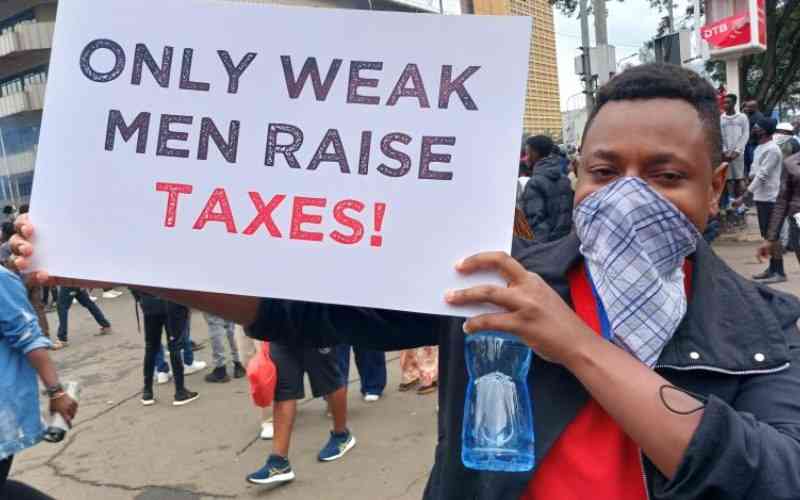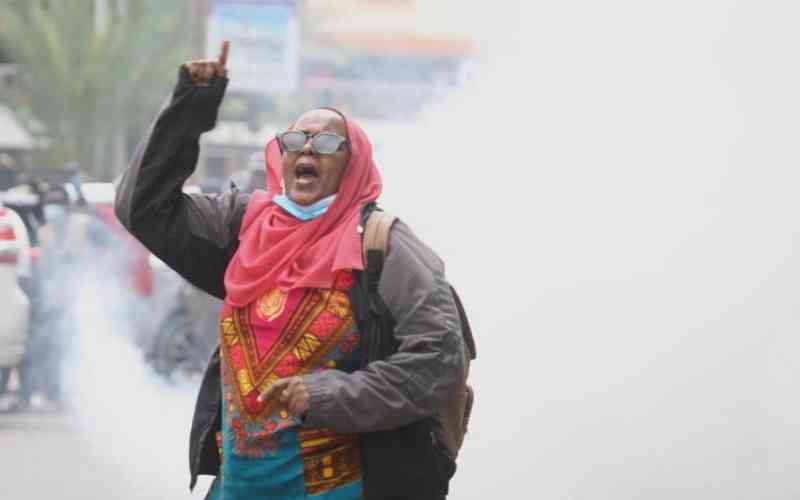
Like a well-oiled machine, with precision and highly coordinated teams, this week the youth took the nation by storm, hitting the streets to protest the Finance Bill.
Contrary to the popular belief that they are soft, entitled, snowflakes, lazy and lack a deep understanding of current affairs, the lethal combination of millennials and Generation Z has been astonishing. The writing was on the wall; you can no longer have the cake and eat it too.
Their well-orchestrated movements both online and offline have not only sent shockwaves through the status quo, leaving elites squirming in discomfort but have also seen those in the authority scratch their heads as they ponder on what move they can come up with to counter this new wave.
It is no longer business as usual with the online frontier of the government overwhelmed and the desperate efforts of the rear-guard not able to match the digital war that is taking no prisoners.
“It is one thing for a protest to happen, but it’s another when a Gen Z is involved and seriously participating in it. Mostly, Gen Z’s are taken to be lazy and sometimes people say they don’t take anything seriously,” says Mercy Masai, an influencer on X.
Mercy says this time they decided to take their protests to the streets as they are entering the labour force during challenging economic times, with student HELB loans, high cost of living, and payment stagnation being major concerns.
“The burden of taxes can feel more significant when financial stability is harder to achieve. Additionally, there is a general distrust in the government among many young people, partly due to perceived corruption. This distrust extends to the belief that taxes are not being used effectively or equitably. Why impose more?” she poses.

They are armed with time, and assistive technology such as AI to break the Bill from the bulky document it is to just a few paragraphs.
Enter the Baddie Season of protesters with a heavy touch of millennials who were assigned to other important roles like making sure the whole thing runs smoothly and mobilising fellow lawyers to make sure matters law are well handled.
Taking a cue from what their American counterparts are doing in university, the Kenyan youth are fearless and conversant with current affairs. This creates an additional role for social media in the changing face of protest through its ability to inform and expose young people to social causes.
Mercy, who also runs Mercy Mission Foundation says despite the noise, the government has turned a blind eye on sanitary pads taxes, something that has ruffled feathers the wrong way.
“There is an African proverb that says “He that beats the drum for the madman to dance is no better than the madman himself.” That’s what the government is trying to do,” she says.
Rapper and activist Monaja says the use of music comes as an expectation for artistes to use their art to advocate for political transformation within a certain framework, thereby reinforcing it as a frame of reference.
“It takes ideological grounding, which most artistes do not have, to see the limits of this reformist project. Most from such engagements will make music, which on the face of it may seem subversive, but at its core, legitimises the state and its oppressive nature – its inherent tendency to work for Kenya’s ruling elite and foreign capital,” he says.

“We have seen them use and manipulate TikTok videos to fix their messages which are shared all over. We saw Rose Muhando’s music being used to protest the President’s foreign trips. They are also using skits for messaging with a combination of funny and viral clips being used to drive their point home,” says rapper and artivist Jay Mau Mau.
Jay says this is a change of guard in the history of the country, as the creative space is also being involved in this protest.
“We had the likes of Erick Wanaina, Juliani and King Kaka in the last few years, but now we are seeing a new crop of artistes and actors who are not afraid of using the power of the mic and camera to express themselves,” he says.
“I know tuko mood ya ‘sitasimama maovu yakitawala..’ lakini, what I have witnessed today, you young people I raise you ‘walitudharau....’ I am honoured to witness your greatness,” posted Juliani on X.
They carry placards printed with unfathomable words but wittingly put together, some of which would make the devil blush, all aimed at the authorities. Online the scenario was the same, often punctuated with a congratulatory message of wametufeel.
Organising and mobilising have become easier with technology through platforms and Apps like TikTok, IG, X and Facebook serving as hubs for information and networking.
X user and influencer Kimaiyo Fredrick has been mobilising those in the diaspora to pool resources for a bulky task, for which he gladly volunteered and raised Sh56,000 on Tuesday and more than Sh150,000 for yesterday’s protests.

“My DMs are full and people are still making inquiries on how they can be part of this. The good side is that it unites people regardless of their tribe or religious affiliation. We are fundraising to raise money for the warrants, print merchandise and buy water. The best part of it is how we have managed to rally people to be peaceful and not vandalise property,” he says.
Businesswoman and X influencer Njoki Njanja was part of the hundreds who were arrested and went viral with her video clips showing them singing protest songs in a jolly mood, while in custody.
“The government is been used to having its way, with minimal consequences; they assumed it’s going to be business as usual. We wanted to amplify the noise for people to come out and they did. When they saw some of us singing at the Central Police Station, more and more people are willing to come out and take part in the protest,” she says.
Njoki Njanja says that the use of technology especially the taking of videos of police harassing people worked as it sent a message that everything is being watched by thousands if not millions of people.
“I was angry enough to go to the street because when you look at this Bill, it is punitive and is not for Kenyans. We can’t have an executive getting a bigger budget for globetrotting while the health sector and education sector are falling. Taxing cancer treatment drugs is just unthinkable and they will have to listen to us either way because, in this generation, we are not relenting,” she says.
The profound effect of digital spaces in Kenya transforming activism has been impactful in several ways.
“Let’s talk about increased accessibility and participation. I can only call so many people, but I have tens of thousands of loyal followers online on various digital platforms. Enter Wider Reach- Quickly and Efficiently Decentralising Information and Access to the said Information,” says Nyandia Gachago, a digital marketer.
Nyandia says that the other impact has been achieved through civic education and the amplification of even the smallest of voices, giving them a platform to be heard. Issues that might be overlooked by mainstream media can gain attention and support through social media.
“The highlight has been the increased accountability or citizen journalism. You have seen Kenyans document and share incidents of injustice or corruption using their smartphones. This has caused public officials and institutions more likely to be scrutinised and held accountable for their actions,” she says.

Nyandia says Kenya’s digital spaces are revolutionising activism by increasing accessibility, enhancing visibility, and providing new tools for advocacy and collaboration.
“While there are challenges to navigate, the potential for digital activism to drive social and political change is significant. The digital landscape empowers Kenyan activists to organise, mobilise, and amplify their voices like never before, fostering a more engaged and informed society,” she says.